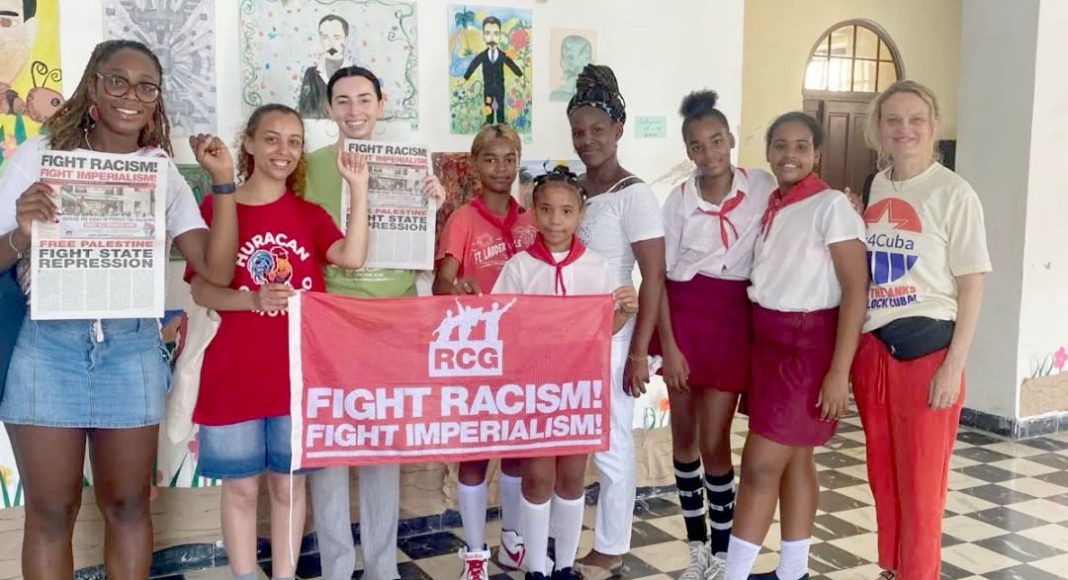Amid deepening economic and political challenges, Cuba is reaffirming its commitment to building socialism, showing revolutionary unity and resolve in the face of crisis. In early July 2025, the 10th Plenary Session of the Communist Party of Cuba (PCC)’s Central Committee provided space for the PCC to evaluate progress and chart the way forward. President Miguel Díaz-Canel stated that Cuba is ‘a country at war. This is a war without bombs, but it is war all the same.’ Cuba’s response to this war? A reaffirmation of its revolutionary path. The 10th Plenary shows that socialism in Cuba is alive and defended by the people.
In his speech at the Plenary, President Díaz-Canel exposed the strategy of US imperialism: to exploit and worsen Cuba’s existing economic hardships and social challenges, aiming to provoke unrest through intensified sanctions, threats, and psychological warfare. On 30 June 2025, the US issued a National Security Memorandum, clearly continuing the policy of crushing Cuba through unbearable conditions to spark rebellion. This new memorandum confirms the US intent to wear down Cuban society until total collapse. It introduced new sanctions, including expanding the blacklist of Cuban hotels, tightening regulations on professional and educational travel groups, and keeping Cuba on the state sponsors of terrorism list. These measures strike a double blow: cutting off tourism, once a vital economic lifeline, and keeping Cuba out of global finance by designating it a ‘high risk’ for banking and investment.
Continuing this aggressive campaign, on 11 July the US sanctioned President Díaz-Canel, Defence Minister Alvaro Lopez Miera, and Interior Minister Lazaro Alvarez Casas. Timed to coincide with the fourth anniversary of the 11 July 2021 protests in Cuba stoked by US imperialism, this move sought to reignite anti-government sentiment and portray Cuba’s revolutionary leadership as oppressive, intensifying efforts to destabilise the island from within. The Cuban Foreign Ministry denounced these sanctions as ‘a cynical and hostile provocation’.
The 10th Plenary Session of the Central Committee brought Cuba’s leadership together to define the path ahead. The Plenary evaluated the Government Programme, launched in November 2024 to steer economic recovery through 2026. Prime Minister Manuel Marrero Cruz presented a review of progress in the first half of 2025 and the tasks ahead. Leaders noted gains in stabilising energy supply, expanding renewable infrastructure and protecting vulnerable communities, while emphasising the need for continued collective effort and socialist planning to secure national recovery.
Despite these gains, Cuba still faces frequent power blackouts, which Political Bureau member Roberto Morales Ojeda identified as a major cause of public dissatisfaction. Outages lasting up to 38 hours disrupt food preservation, water supply, and daily life, fuelling frustration. Energy was a central focus of the Plenary. Over 65% of blackout hours stem from fuel shortages, caused by restrictions on vital imports imposed by the blockade, which limit Cuba’s ability to access and maintain necessary energy resources and infrastructure. The Government Programme for National Electric System Recovery was evaluated through a report based on popular consultation. Teams visited 111 energy sites, held exchanges with provincial authorities and citizens’ services, and grassroots organisations of the PCC and the Union of Young Communists (UJC). Over 3,800 Cubans contributed more than 6,000 comments and nearly 3,000 proposals. This is socialist planning in action: collective, participatory, and rooted in people’s needs.
The Plenary set clear objectives to restore Cuba’s energy system: recovering capacity at thermoelectric plants using domestic fuels; maximising output from Cuban crude and gas; and reducing dependence on diesel generators. This strategy includes expanding photovoltaic parks, built with Chinese cooperation, which is a step towards energy sovereignty and climate-conscious development. Building energy infrastructure under sanctions is a political act and a form of resistance in the face of imperialist sabotage.
On the ideological front, the Plenary also addressed social challenges linked to the intensifying war against Cuba by US imperialism. A key front in this war is ideological: a campaign of digital disinformation aimed especially at Cuban youth. This is not just a battle of narratives but a deliberate form of sabotage. Foreign-controlled media and social platforms weaponise algorithms to spread lies and confusion that fracture revolutionary consciousness, erode confidence and isolate young people from socialism. This psychological warfare seeks to dismantle the moral and social fabric of Cuban society through manipulation.
During the Plenary, the PCC reaffirmed its commitment to strengthening its communication strategy to defend truth, sovereignty, and collective purpose. The UJC is central to this strategy, leading initiatives like ‘Tumba el Bloqueo’ (Knock Down the Blockade) – a nationwide programme of exchanges with young people aimed at exposing media lies, explaining how the blockade functions and mobilising youth in defence of the revolution. The Plenary reaffirmed that political education, mass mobilisation, and ideological clarity are essential weapons to counter this attack and to strengthen revolutionary unity.
Confronted with this intensifying ideological war, the Cuban state is advancing with clarity, organisation and political resolve. In this context, the Plenary decided to convene the 9th Congress of the Communist Party of Cuba – a necessary and timely move to strengthen revolutionary leadership and unity at a critical moment. The Congress will take place in 2026, marking 100 years since the birth of Cuba’s late revolutionary leader Fidel Castro, a symbol of uncompromising anti-imperialist struggle. This Congress will be a space for mobilisation, planning and reaffirmation of Cuba’s socialist path. It signals clearly: the answer to imperialist sabotage is organised resistance and revolutionary power.
Under siege, Cuba resists; under blockade, it builds. Through popular consultation and planning, the revolution is defended in practice, not just in words. As US imperialism ramps up its war, sanctions, blackouts and media disinformation, Cuba fights back. Despite every sanction imposed, the people remain determined to defend their revolution, guided by a steadfast revolutionary leadership. We must stand with socialist Cuba, exposing the media lies and organise against the blockade. Build solidarity with Cuba, defend the gains of revolution! Viva Cuba socialista! Tumba el bloqueo!
Destinie Sánchez
Fight Racism! Fight Imperialism! 307, August/September 2025




